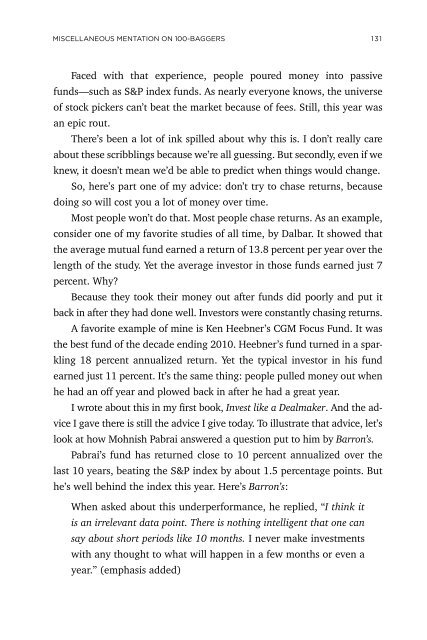You also want an ePaper? Increase the reach of your titles
YUMPU automatically turns print PDFs into web optimized ePapers that Google loves.
MISCELLANEOUS MENTATION ON 100-BAGGERS 131<br />
Faced with that experience, people poured money into passive<br />
funds—such as S&P index funds. As nearly everyone knows, the universe<br />
of stock pickers can’t beat the market because of fees. Still, this year was<br />
an epic rout.<br />
There’s been a lot of ink spilled about why this is. I don’t really care<br />
about these scribblings because we’re all guessing. But secondly, even if we<br />
knew, it doesn’t mean we’d be able to predict when things would change.<br />
So, here’s part one of my advice: don’t try to chase returns, because<br />
doing so will cost you a lot of money over time.<br />
Most people won’t do that. Most people chase returns. As an example,<br />
consider one of my favorite studies of all time, by Dalbar. It showed that<br />
the average mutual fund earned a return of 13.8 percent per year over the<br />
length of the study. Yet the average investor in those funds earned just 7<br />
percent. Why?<br />
Because they took their money out after funds did poorly and put it<br />
back in after they had done well. Investors were constantly chasing returns.<br />
A favorite example of mine is Ken Heebner’s CGM Focus Fund. It was<br />
the best fund of the decade ending 2010. Heebner’s fund turned in a sparkling<br />
18 percent annualized return. Yet the typical investor in his fund<br />
earned just 11 percent. It’s the same thing: people pulled money out when<br />
he had an off year and plowed back in after he had a great year.<br />
I wrote about this in my first book, Invest like a Dealmaker. And the advice<br />
I gave there is still the advice I give today. To illustrate that advice, let’s<br />
look at how Mohnish Pabrai answered a question put to him by Barron’s.<br />
Pabrai’s fund has returned close to 10 percent annualized over the<br />
last 10 years, beating the S&P index by about 1.5 percentage points. But<br />
he’s well behind the index this year. Here’s Barron’s:<br />
When asked about this underperformance, he replied, “I think it<br />
is an irrelevant data point. There is nothing intelligent that one can<br />
say about short periods like 10 months. I never make investments<br />
with any thought to what will happen in a few months or even a<br />
year.” (emphasis added)


